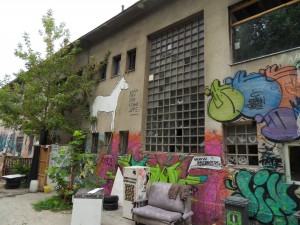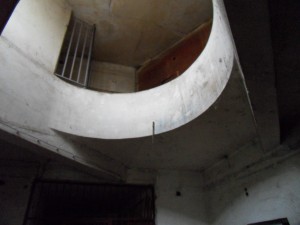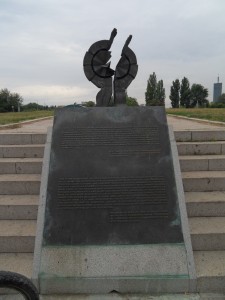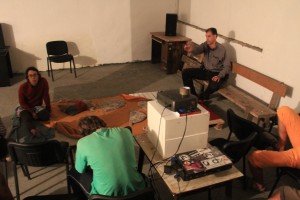On entering Belgrade (8th September) we met up with some of the local Critical Mass crew along the Danube, led by a Serbian Biketour veteran, who showed us some of the problems for cyclists that are squeezed off the roads by heavy car and summer pedestrian traffic.
 Our mini Critical Mass ended on the outskirts of Belgrade, at the ex cinematography factory, now a thriving squatted social center where we were to be hosted called Inex Film.
Our mini Critical Mass ended on the outskirts of Belgrade, at the ex cinematography factory, now a thriving squatted social center where we were to be hosted called Inex Film.
The huge building at Inex was once left abandoned, and squatted by various characters, latterly artists and activists who revived it from being near derelict into what it is today.
It now hosts many artist workshops, studios and exhibition spaces; a bar, D.I.Y Info Shop, evens, concerts and film screenings, along with a circus training room and a school for local Roma children.
The building has had many guises, and now although occupied by very different groups, they try by consensus to stick to some basic autonomous fundamentals, such as anti-nationalism and running only by non corporate donations.
The kindergarten, that has been running every weekday morning since July this year, was set up to be entirely self organised by volunteers and by donations for resources.
The morning after we arrived some of the Biketour volunteered to lend a hand with the kindergarten. Trying to help the tutors, without being able to speaking any Serbian, or Roma, we encouraged the children, aged between 4 and 9 years old, to free play with lego, drawing or painting, encouraging them to focus on one activity at a time, to work together and to cooperate.
The next lesson was learning parts of the calendar – the names of the months, and numbers, each person intern adding a piece to the board. After some games and lively singing (with actions), we helped the children wash their hands before we ate lunch together, prepared at Inex from vegetables that had been donated by the nearby market. After lunch one of the Roma parents collected the children to walk them back to their community nearby.
It was clear from that short interaction of one morning, how much the children appreciated being shown attention and respect from such dedicated adults, who were clearly providing something very positive for their community.
Later we held an interview with one of the founders of the school, originally from Skopje, Macadonia, where he had spent many years with the Roma community there, learning to speak Romani, and was even donated one of their houses to live in.
The interview is currently being transcribed and will be available in the future in the form of a Biketour Zine or short video.
 In the afternoon some of the Biketour attended a discussion and tour of a former Nazi concentration camp, Sajmiste, (1941–1944), for Jews, Sorbs and Romas.
In the afternoon some of the Biketour attended a discussion and tour of a former Nazi concentration camp, Sajmiste, (1941–1944), for Jews, Sorbs and Romas.
 There we saw two monuments from diffrent time periods depicting different acknowledg -ments of who was actually killed there, the Roma people for example, often not included in official statistics in concentration camps due to their lack of papers and auditing.
There we saw two monuments from diffrent time periods depicting different acknowledg -ments of who was actually killed there, the Roma people for example, often not included in official statistics in concentration camps due to their lack of papers and auditing.
The building complex was originally built as an exhibition center to show case Belgrade and to improve its international role in trade and commerce. You could see from the number of mailboxes, that part of the building is now used as atelier space, despite its dark history.
That evening, still on the Roma theme, we held an info evening open to the public in the Inex Info Shop about the persecution of Roma families in Hungary, from the perspective of a Biketour participant originally born in Hungary, now living in the UK. The evening included this short film by The Guardian in 2012;
The discussion was followed by a film screening of Just the Wind (trailer below), a gritty dramatisation based on the true story of a Roma family targeted by Hungarian death squads:
The following evening we again held a public event this time in the Inex bar, that included a short talk about the Biketour and a screening of the film The Weight of Chains, a Canadian documentary that criticises neocolonialism and the role the US, NATO and the EU played in what the film describes as “the tragic breakup of a once peaceful and prosperous European state – Yugoslavia.’
 We had already screened this film once in Slovenia at the Art Centre, but this time we were not only seeing it with new eyes, from having cycled through many of the places mentioned in the film, but we also had a public audience and a special guest …one of the lead voices of the documentary John Bosnitch, now living in Beograd, who amazingly on our invitation came to the screening and gave his input during a the informal discussion that followed the screening.
We had already screened this film once in Slovenia at the Art Centre, but this time we were not only seeing it with new eyes, from having cycled through many of the places mentioned in the film, but we also had a public audience and a special guest …one of the lead voices of the documentary John Bosnitch, now living in Beograd, who amazingly on our invitation came to the screening and gave his input during a the informal discussion that followed the screening.
So, a pretty impressive repertoire for self organisation! All in all our experience at Inex was truly thoughtful, welcoming and creative, aided by the generous and community minded people who lived there, whos energy was infectious, and who made delicious pancakes….THANK YOU Inex for your inspitation for Every Day Action!







